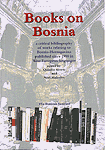
|
 |
 |
Selected Longer Reviews
Slobodan Milosevic and the Destruction of Yugoslavia
|
By Sell, Louis
|
Duke University Press, Durham and London ,
2002,
Price: 25.00 Pound Sterling
Shelf mark: 949.71'03'092
|
Big lies, little lies
by Ian Traynor
Scowling at the world through a screen of bullet-proof glass in a courtroom in The Hague, Slobodan Miloševic resembles not so much a fallen head of state as an ageing Mafia mobster.
He stoops and sprawls in a double-breasted suit, oozing contempt for the judges and the media. Permanently guarded by two men in uniform, he bullies witnesses and discomfits them by displaying intimate knowledge of their biographies, as if to boast that his old networks remain intact and are maintaining the mysterious flow of information to his cell in Scheveningen on the North Sea. Information is power, even from inside a prison cell.
The 99-page charge sheet that accuses Miloševic of genocide in Bosnia and war crimes in Croatia and Kosovo declares him to be the linchpin of ‘a joint criminal enterprise’ - Miloševic the Godfather. The indictment, of course, relates solely to alleged war crimes, not gangland shootings or underworld turf battles. But the Sicilian model provided a template that he applied to national and international politics.
The system of criminal networks Miloševic built or allowed to flourish through an uncanny talent for exploiting the basest of human instincts turned the Balkans upside down. In the mobsters' paradise that Miloševic’s Serbia became, the constraints on acceptable behaviour were lifted. The result was a Dostoyevskian moral vacuum where values were prized only for their utility. The road to Miloševic’s Greater Serbia went via the slaughter of Srebrenica, the siege of Sarajevo, the levelling of Vukovar, the emptying of Kosovo - the darkest days in Europe since the Nazis.
Louis Sell is intrigued by the transformation of Miloševic from mediocrity to monster. He surfaced in the mid 1980s as an ambitious if unremarkable Communist party apparatchik. Sell, a former US diplomat, kicks off his riveting biography in Kosovo in April 1987 with Miloševic’s famous pledge to rioting Serbs that ‘no one will ever beat this people again’. Of course, he spent the rest of his career beating Croats, Bosnians and Albanians, as well as Serbs. But Sell, who spent many years in Belgrade, speaks Serbo-Croat and met Miloševic many times, interprets the 1987 incident as the pivotal moment that fired Miloševic’s ruthlessness and brought an awareness of his own potential power.
The pledge to Kosovo's Serbs was a barefaced lie uttered with all the chutzpah of a self-evident truth. The big lie and the little lie are the leitmotifs of a 13-year career steeped in treachery and betrayal of almost everyone who had to deal with Miloševic- everyone bar his troubled and formidable wife, Mira Markovic. More than a decade ago, the outgoing US ambassador in Belgrade, Warren Zimmerman, told me that Miloševic was ‘an egregious liar for whom the truth has no inherent value’.
The big lies were broadcast every night on Serbian state television. The Americans, the Germans, the Vatican, the Iranians were all alternately or in concerted destroying Serbia. Everyone was to blame except the Serbs. The Croats were fascists, the Bosnians were Islamist fundamentalists, the Slovenes were German lackeys, the Albanians were terrorists and rapists.
Then there are the little lies. When Miloševic was overthrown in October 2000 his victor, Vojislav Koštunica, went to see him and told him the constitutional court had ruled that he, Koštunica, had defeated Miloševic fairly and squarely at the ballot box. Miloševic feigned ignorance and surprise at the ruling, ‘one of the most egregious lies in a career notorious for its repeated falsehoods,’ writes Sell.
Both Sell, who served under Zimmerman in Belgrade, and Adam LeBor, a Budapest-based British journalist, seek to explain the Miloševic phenomenon as the result of a split personality. ‘One is a charming Balkan rogue, a confidant of presidents and ambassadors, a deft schmoozer of Western diplomats,’ writes LeBor. ‘The other is an authoritarian provincial communist functionary of limited vision and poor strategic sense.’ Sell cites Zimmerman on ‘the existence of two Miloševic’s. One was a hardliner and belligerent, while Miloševic Two was affable and always looking for reasonable solutions.’
LeBor is right to point out that the reckoning unfolding in The Hague is serving to reveal the persistence of the old apparatchik in Miloševic the power politician who fused communist technologies of control with Mafia-style criminalization to hijack Yugoslavia.
These two books, both drawing substantially on the long years of work by Miloševic’s Serbian biographer Slavoljub Ðukic, are the best yet to explain in English how Miloševic operated and ended up behind bars as the first head of state to be charged with genocide.
Miloševic launched and lost four wars. By 1998, before NATO's bombing of Yugoslavia, Serbia's gross domestic product was half what it had been when Miloševic took over a decade earlier. Industrial output was a third of the 1988 level. By the time Miloševic bowed out with a surprising whimper rather than the Belgrade bloodbath that had long been expected, more than three million people had lost their homes in former Yugoslavia and between two and three hundred thousand had lost their lives.
But still the lying continues. The Serbian slaughter of 7,000 Muslim men at Srebrenica in 1995 has been exhaustively researched and investigated by the Hague tribunal, the French national assembly, the Dutch government and the American Pulitzer prizewinner David Rohde. According to Miloševic not long ago in The Hague, the massacre was perpetrated by the French secret service in cahoots with Croatian mercenaries.
This review by the paper’s central European correspondent appeared in The Guardian (London), 24 October2002
Back to Books on Bosnia

|
|
 |

Books on
Bosnia:A database of 379 book reviews and 3741 books held by the Institute:
|
|